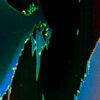Tomorrow poems inspired by Titian by Jo Shapcott, George Szirtes, Seamus Heaney, Simon Armitage, Don Paterson, Carol Ann Duffy and Lavinia Greenlaw will be published on granta.com.
Artwork: Titian, Diana and Callisto, 1556-9
Jo Shapcott reads her poem ‘Callisto’s Song’ and talks to online editor Ted Hodgkinson about what drew her to render Callisto’s tragic transformation, and George Szirtes explains why he was compelled by Actaeon’s wayward gaze.
Tomorrow poems inspired by Titian by Jo Shapcott, George Szirtes, Seamus Heaney, Simon Armitage, Don Paterson, Carol Ann Duffy and Lavinia Greenlaw will be published on granta.com.
Artwork: Titian, Diana and Callisto, 1556-9

‘We meet at various points in the great swathes of the past that neither of us were alive to witness.’
Allen Bratton on a daytrip to a castle with his older boyfriend.

‘Listening to three white poets, whom I suspect are academics, talk about the state of poetry.’
Oluwaseun Olayiwola eavesdrops on an older generation.

‘I’d been dubious about his company at first.’
Sarah Moss on watching Shakespeare with her twelve-year-old son.

‘She didn’t trust us because, to her, tenants were like children.’
Kate Zambreno on negotiating with her older landlady.

‘A moment now swallowed in embarrassment, I asked a question only a young person might ask an older one.’
Lynne Tillman on trying to understand what makes a generation.
Jo Shapcott was born in London. Poems from her three award-winning collections, Electroplating the Baby (1988), Phrase Book (1992) and My Life Asleep (1998) are gathered in a selected poems, Her Book (2000). She has won a number of literary prizes including the Commonwealth Writers' Prize for Best First Collection, the Forward Prize for Best Collection and the National Poetry Competition (twice). Tender Taxes, her versions of Rilke, was published in 2001. Her most recent collection, Of Mutability, was published in 2010 and won the Costa Book Award. In 2011 Jo Shapcott was awarded the Queen's Gold Medal for Poetry.
More about the author →George Szirtes was born in Budapest in 1948 and came to England as a refugee in 1956. He was brought up in London and studied Fine Art in London and Leeds. His poems began appearing in national magazines in 1973 and his first book, The Slant Door, was published in 1979 and won the Faber Memorial prize the following year. Since then he has published several books and won various other prizes including the T S Eliot Prize for Reel in 2005. Having returned to his birthplace, Budapest, for the first time in 1984, he has also worked extensively as a translator of poems, novels, plays and essays and has won various prizes and awards in this sphere. His own work has been translated into numerous languages.
More about the author →‘The beasts of the forest drove me out. / The villagers barred their doors. / The gods turned the page.’
‘How far can one deviate from the accepted pieties before one is kicked out?’
Brandon Taylor on naturalism and the future of fiction.
‘I want the reader to be conscious of reading and not being just drawn into the book and forgetting themselves and forgetting their life.’
Claire-Louise Bennett on her novel Checkout 19.
Guy Gunaratne interviewed Margo Jefferson after the winner of the Rathbones Folio Prize was announced, and they discussed her prize-winning book, Constructing a Nervous System.
‘Grief has a warring logic; it always wants something impossible, something worse and something better.’
An extract from Biography of X by Catherine Lacey.
‘Today, I no longer believe that the EU will play a globally influential role in the future.’
Granta’s editor interviews Jürgen Habermas.

The copyright to all contents of this site is held either by Granta or by the individual authors, and none of the material may be used elsewhere without written permission. For reprint enquiries, contact us.